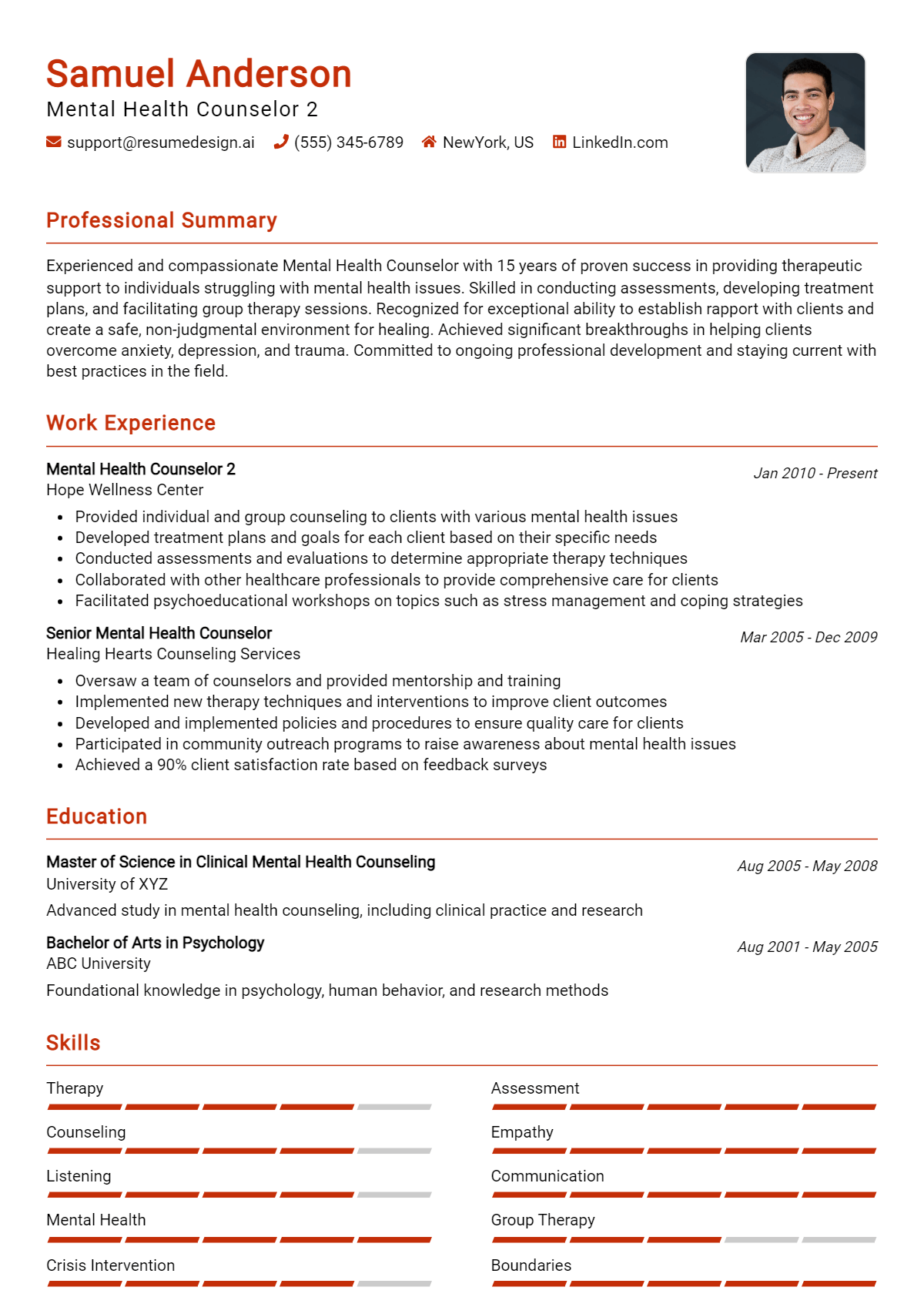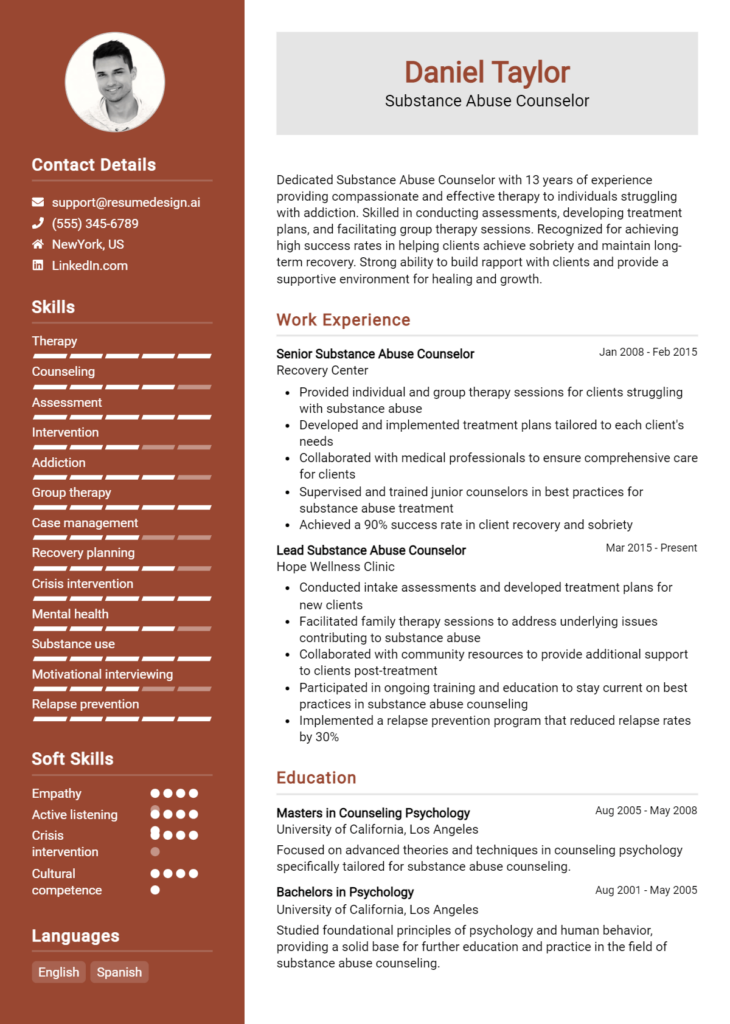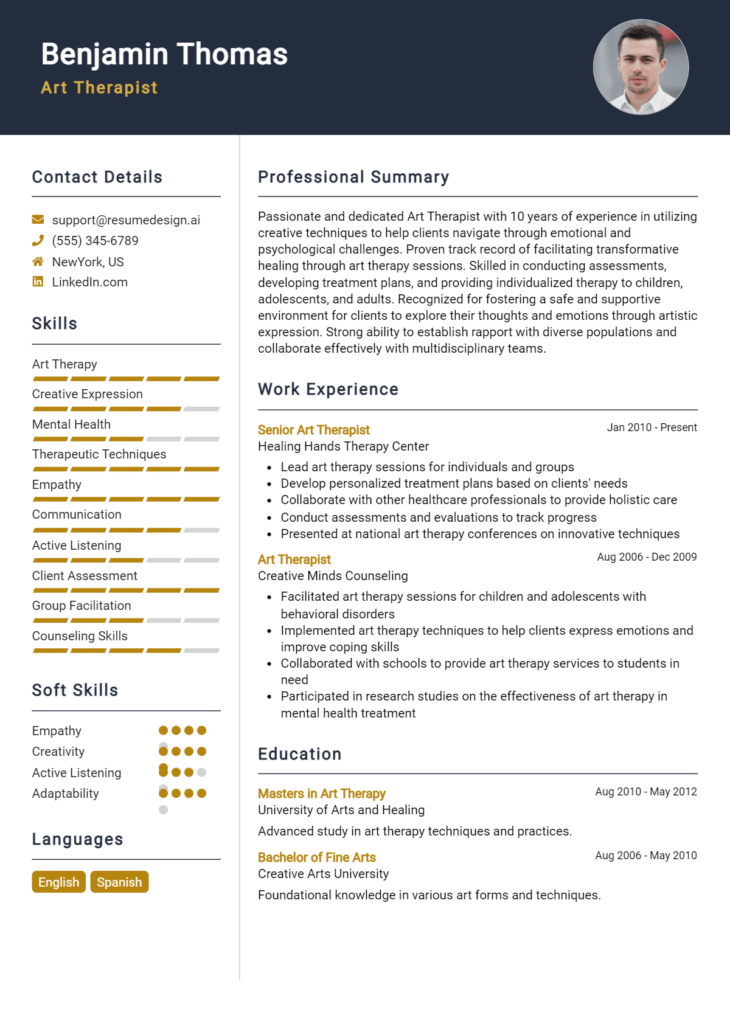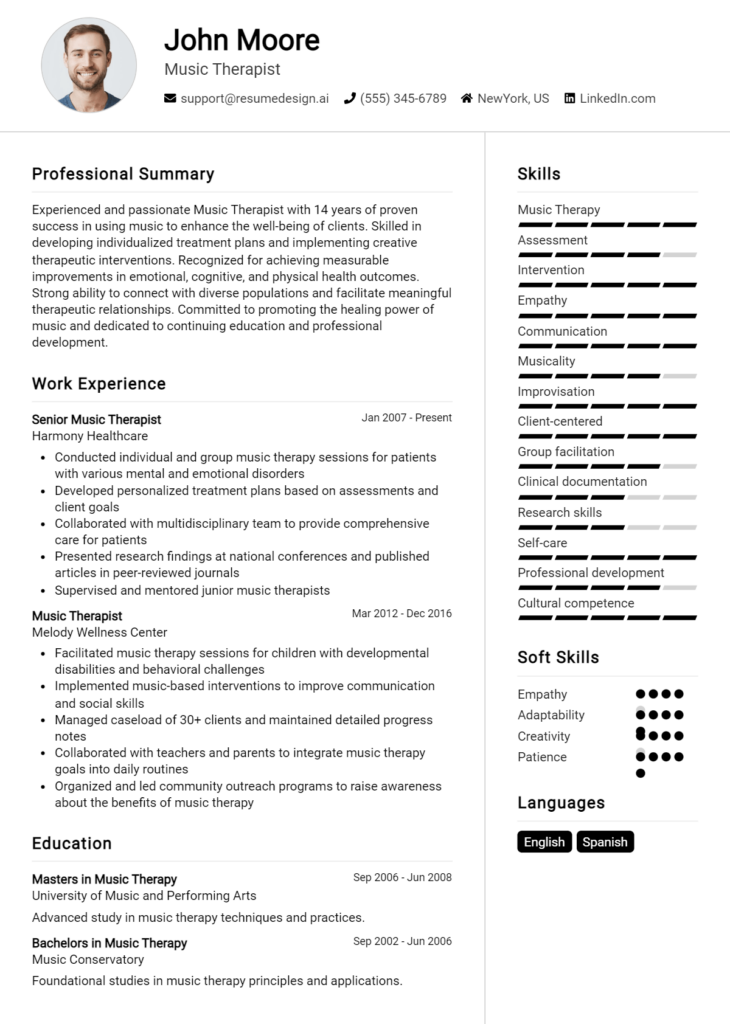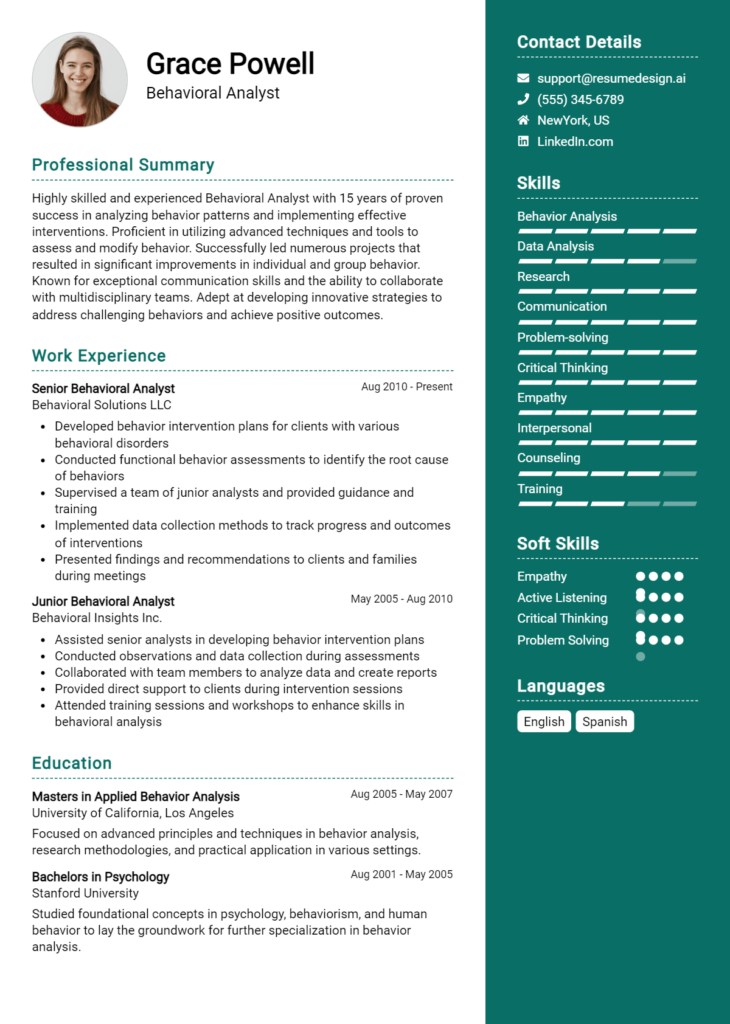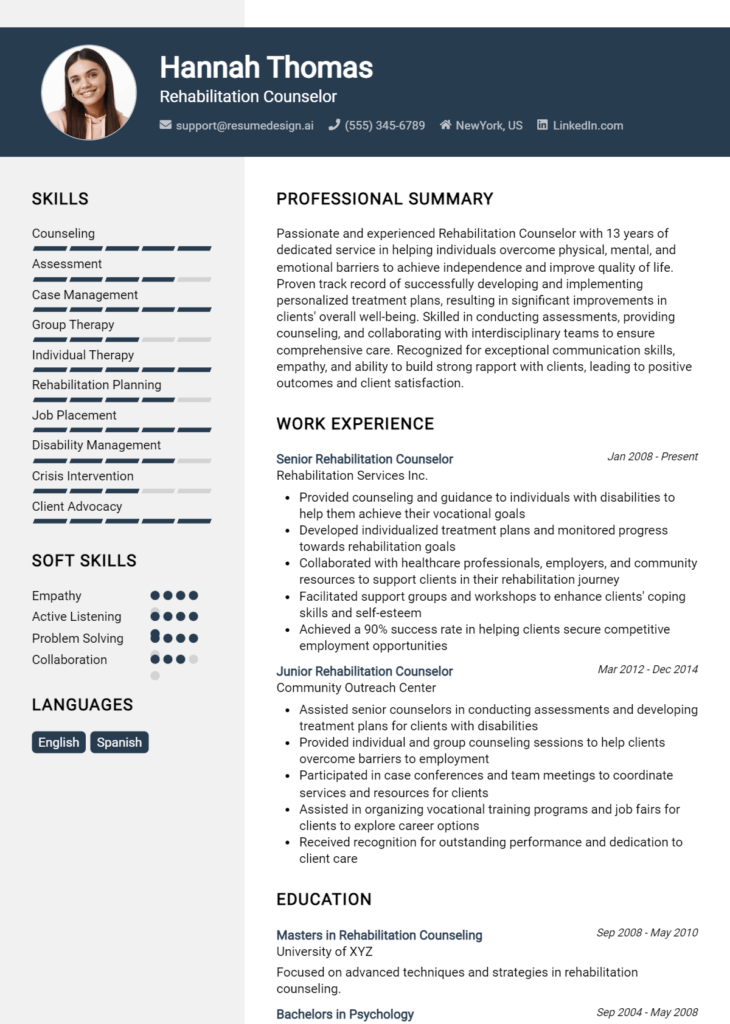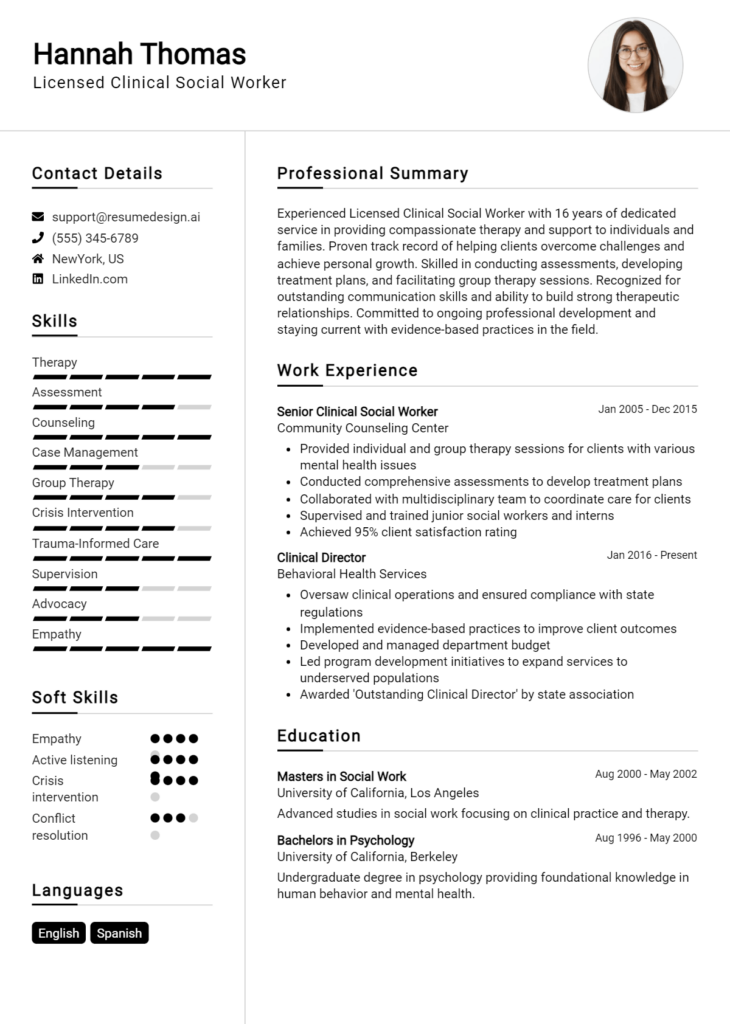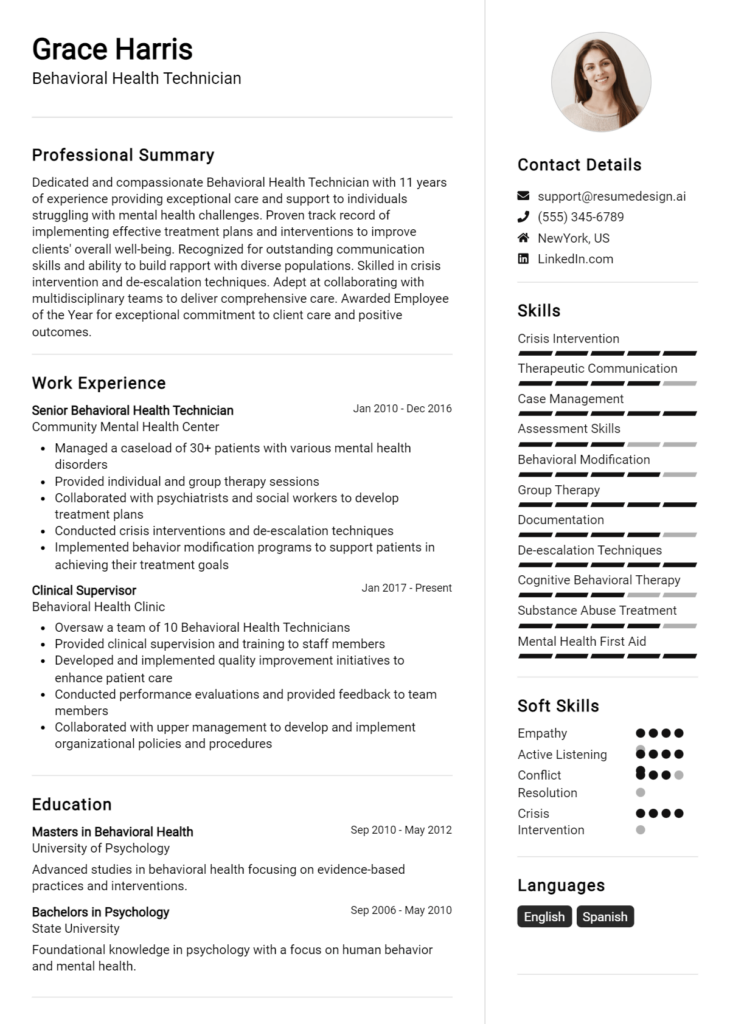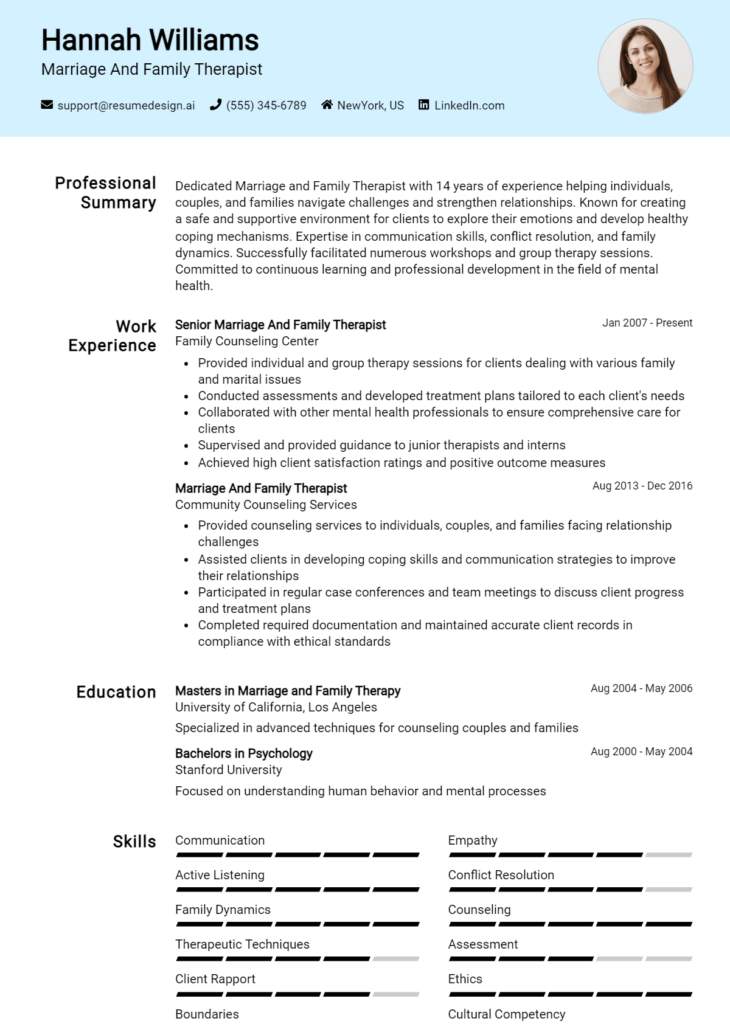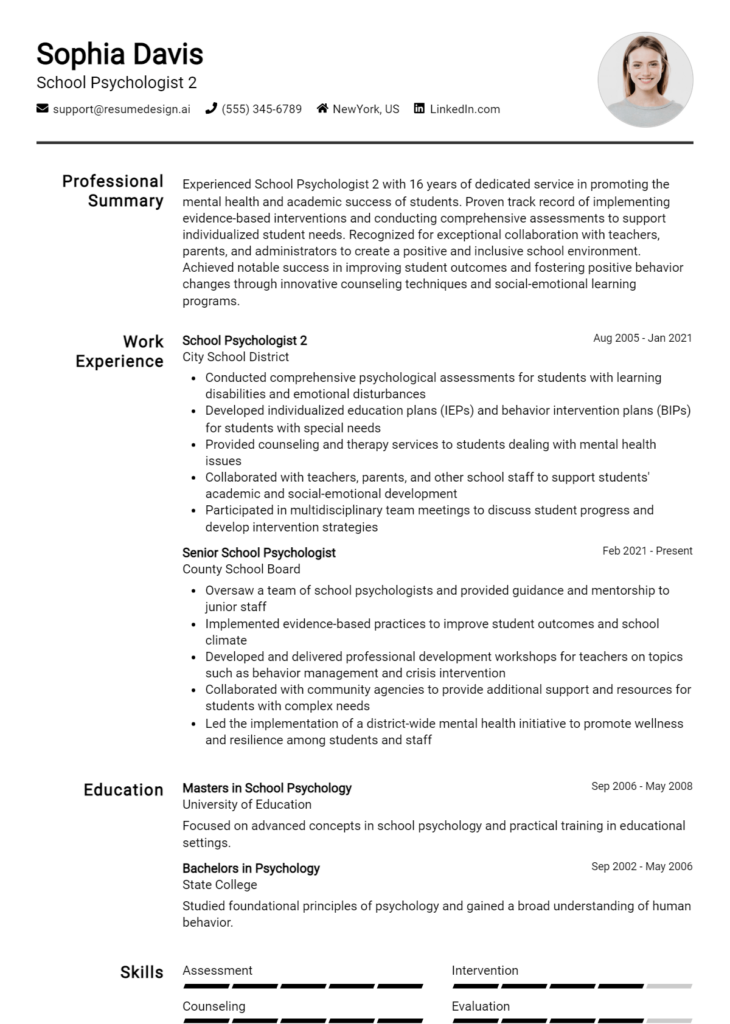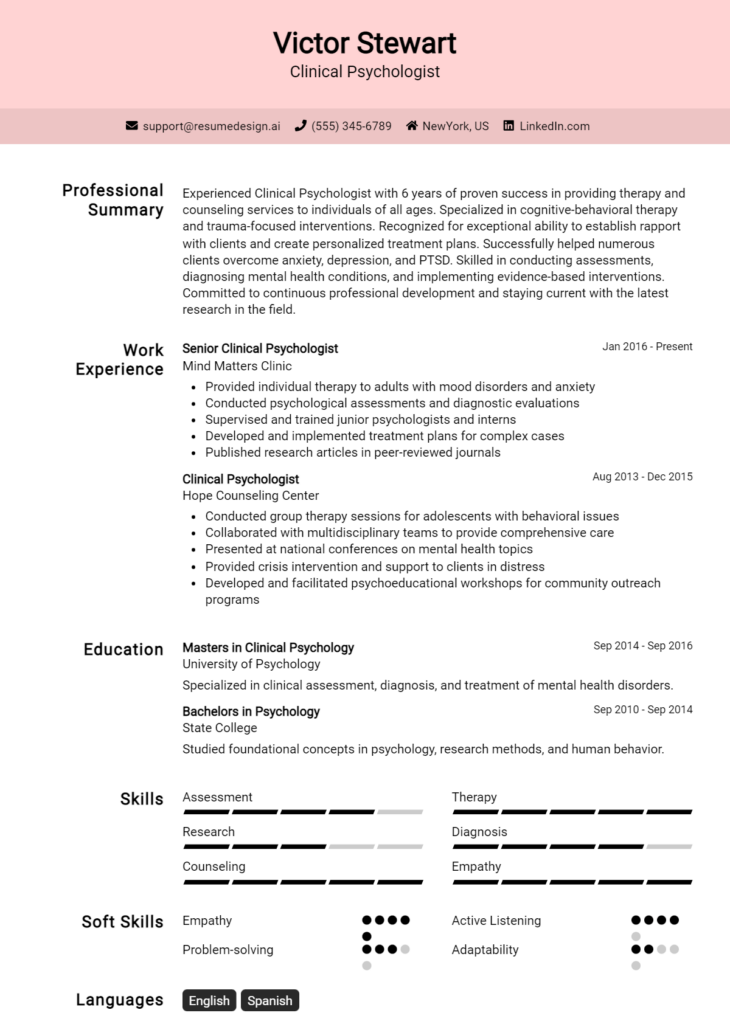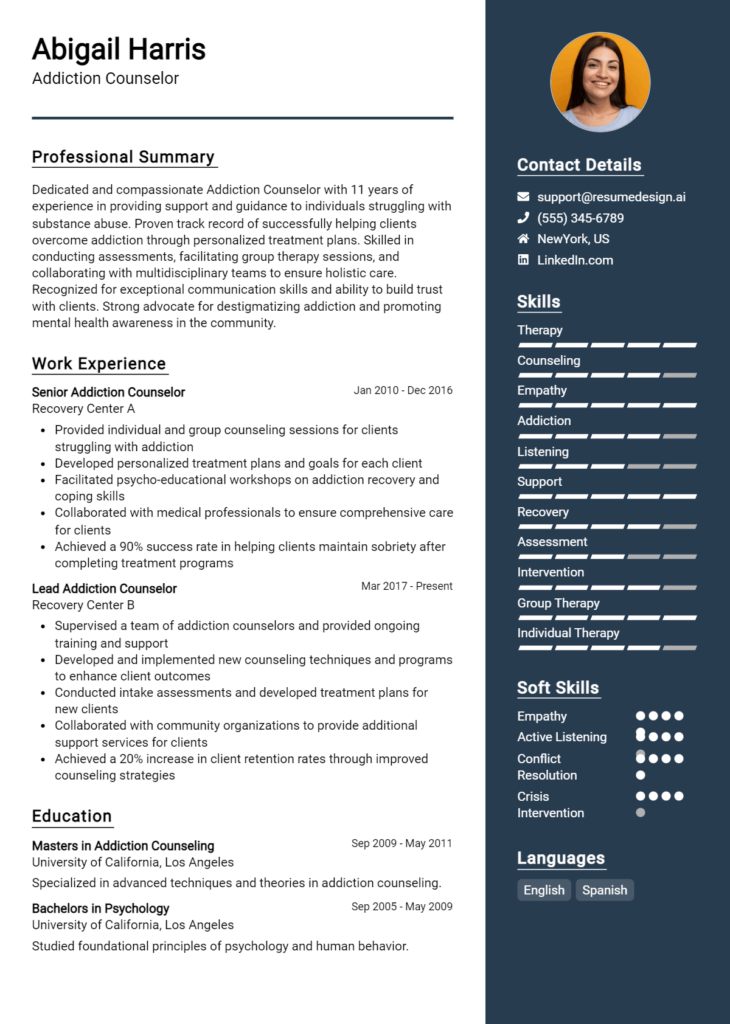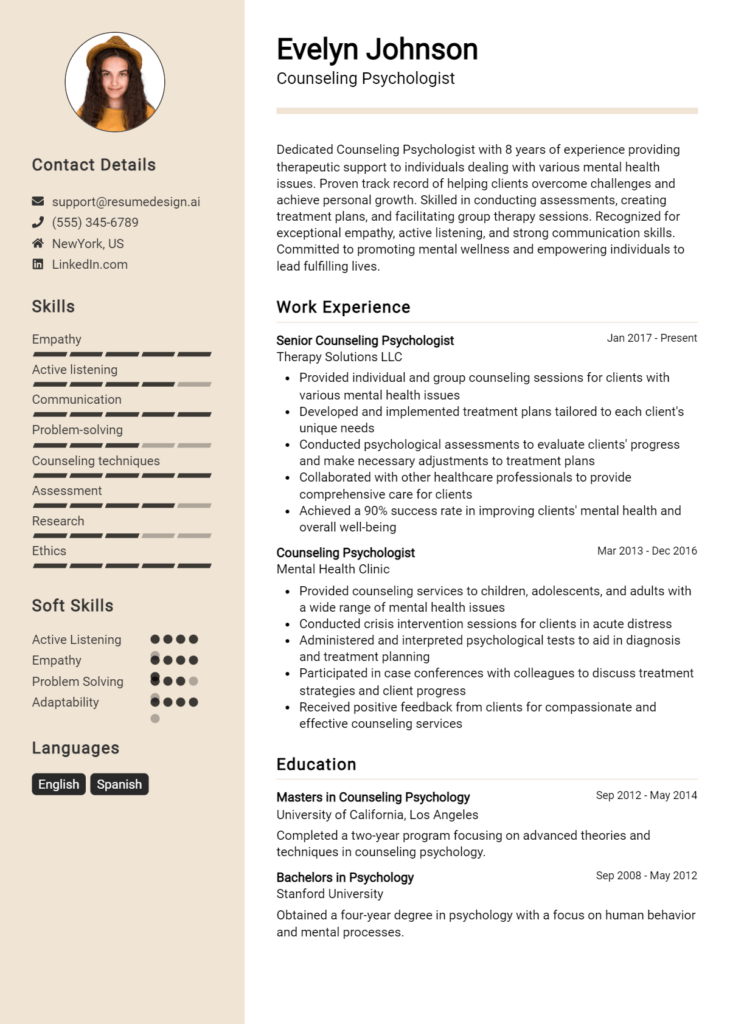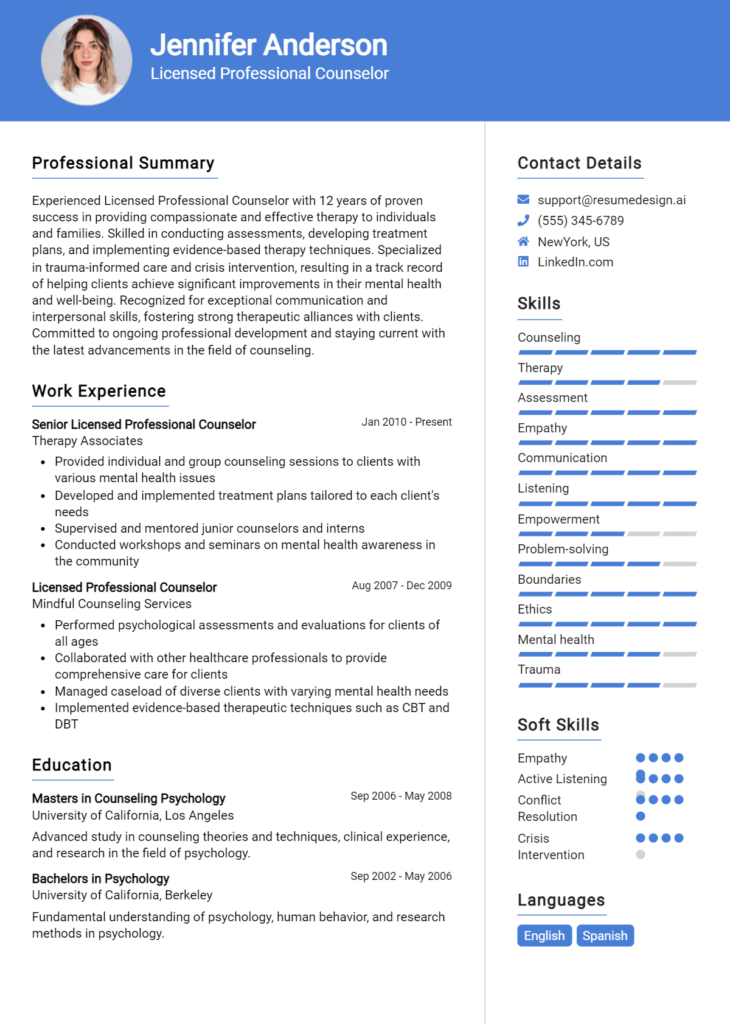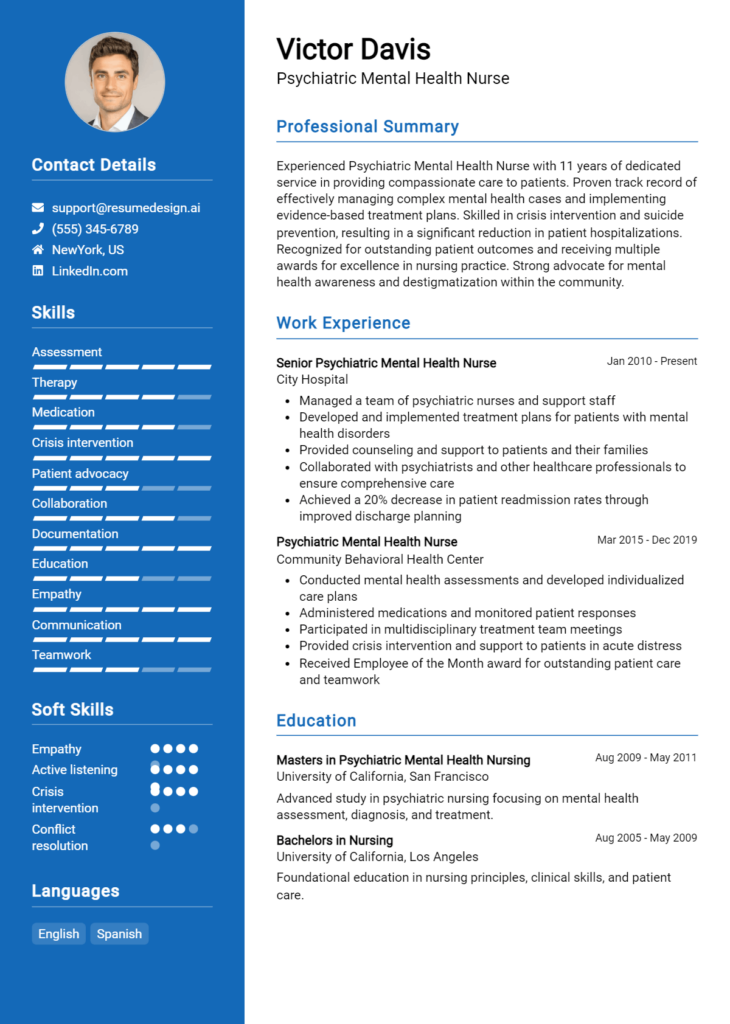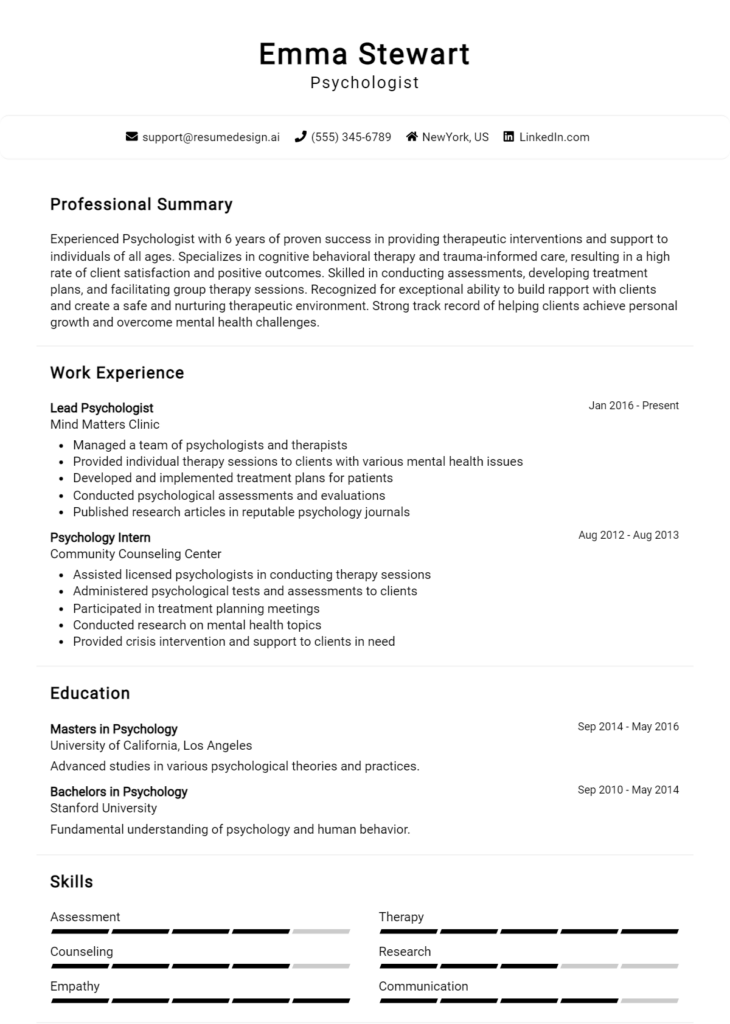Mental Health Counselor Core Responsibilities
A Mental Health Counselor plays a vital role in supporting individuals facing emotional and psychological challenges. Key responsibilities include conducting assessments, developing treatment plans, and providing individual or group therapy. Essential skills encompass strong communication, empathy, and problem-solving abilities, facilitating collaboration across various departments such as healthcare, social services, and educational institutions. These competencies not only enhance client outcomes but also align with the organization’s broader objectives. A well-structured resume effectively highlights these qualifications, showcasing the candidate's ability to contribute to the mental health sector.
Common Responsibilities Listed on Mental Health Counselor Resume
- Conduct comprehensive psychological assessments and evaluations.
- Develop personalized treatment plans based on client needs.
- Provide individual and group therapy sessions.
- Maintain accurate and confidential client records.
- Collaborate with interdisciplinary teams for holistic care.
- Educate clients and families about mental health issues.
- Monitor client progress and adjust treatment plans accordingly.
- Advocate for clients' needs within the community.
- Facilitate crisis intervention and emergency support.
- Stay updated on mental health research and best practices.
- Participate in ongoing professional development and training.
High-Level Resume Tips for Mental Health Counselor Professionals
In the competitive field of mental health counseling, a well-crafted resume serves as your first opportunity to make a lasting impression on potential employers. This crucial document not only showcases your qualifications and experiences but also reflects your unique skills and achievements that make you a suitable candidate for the role. A compelling resume is essential for standing out among other applicants and can significantly influence the decision-making process of hiring managers. This guide will provide practical and actionable resume tips specifically tailored for Mental Health Counselor professionals, empowering you to present yourself in the best light possible.
Top Resume Tips for Mental Health Counselor Professionals
- Tailor your resume to match the job description, using keywords that align with the specific role you are applying for.
- Highlight relevant clinical experience, including internships, volunteer work, and any specialized training.
- Quantify your achievements by providing concrete examples, such as the number of clients served or improvement metrics from treatment programs.
- Emphasize your counseling techniques and methodologies, such as cognitive-behavioral therapy or trauma-informed care, to showcase your expertise.
- Incorporate any certifications or licenses you hold, such as LPC (Licensed Professional Counselor) or LCSW (Licensed Clinical Social Worker), prominently on your resume.
- Include a summary statement at the top of your resume that encapsulates your professional philosophy and counseling approach.
- Showcase your soft skills, such as empathy, active listening, and communication, which are vital in the field of mental health.
- List any continuing education courses or workshops that are relevant to mental health counseling to demonstrate your commitment to professional development.
- Utilize a clean and professional format that is easy to read, ensuring that your most important information stands out.
By implementing these tips, you can significantly increase your chances of landing a job in the Mental Health Counselor field. A polished and tailored resume not only highlights your qualifications but also conveys your dedication to the profession, making you a compelling candidate for potential employers.
Why Resume Headlines & Titles are Important for Mental Health Counselor
In the competitive field of mental health counseling, a well-crafted resume headline or title serves as an essential first impression that can significantly influence hiring managers. A strong headline immediately grabs attention and succinctly summarizes a candidate’s key qualifications in a single impactful phrase. It acts as a powerful tool to convey the individual's expertise, specialization, and unique value proposition, making it easier for employers to assess their fit for the role at a glance. Therefore, a resume headline should be concise, relevant, and directly related to the job being applied for, setting the stage for the rest of the resume.
Best Practices for Crafting Resume Headlines for Mental Health Counselor
- Keep it concise: Aim for one impactful sentence or phrase.
- Be role-specific: Clearly state your position or area of expertise.
- Highlight key qualifications: Emphasize your most relevant skills or experiences.
- Use action-oriented language: Start with strong action verbs to convey your capabilities.
- Incorporate keywords: Use industry-specific terms to ensure your resume stands out in applicant tracking systems.
- Showcase certifications: Mention any relevant licenses or certifications that enhance your qualifications.
- Tailor to the job: Customize the headline for each position to align with the employer’s needs.
- Maintain professionalism: Ensure the tone and language reflect the seriousness of the profession.
Example Resume Headlines for Mental Health Counselor
Strong Resume Headlines
Compassionate Mental Health Counselor Specializing in Trauma-Informed Care
Licensed Professional Counselor with 5+ Years of Experience in Cognitive Behavioral Therapy
Dedicated Mental Health Specialist Focused on Youth and Family Counseling
Weak Resume Headlines
Mental Health Counselor Looking for Job
Experienced Professional
The strong headlines listed above are effective because they clearly convey specific qualifications and areas of expertise, making them immediately relevant to potential employers. They utilize targeted keywords that resonate with the job description, showcasing the candidate’s suitability for the role. In contrast, the weak headlines fail to impress because they lack specificity and do not highlight any unique qualifications or experiences, leaving hiring managers uncertain about the candidate’s capabilities and fit for the position.
Writing an Exceptional Mental Health Counselor Resume Summary
A well-crafted resume summary is crucial for Mental Health Counselors as it serves as the first impression a hiring manager receives. This brief paragraph effectively summarizes a candidate's key skills, relevant experience, and notable accomplishments, quickly capturing the attention of decision-makers. A strong resume summary is concise, impactful, and tailored specifically to the job at hand, making it easier for hiring managers to see the candidate's fit for the role and prompting them to delve deeper into the resume.
Best Practices for Writing a Mental Health Counselor Resume Summary
- Quantify achievements: Use specific numbers or outcomes to highlight your impact in previous roles.
- Focus on relevant skills: Identify the key skills needed for the job and emphasize those in your summary.
- Tailor for the job description: Customize your summary for each application to align with the specific requirements of the position.
- Highlight certifications and licenses: Include relevant qualifications that enhance your credibility as a counselor.
- Use action verbs: Start sentences with strong action verbs to convey confidence and proactiveness.
- Showcase specializations: Mention any areas of expertise, such as trauma-informed care or family therapy, that are pertinent to the role.
- Keep it concise: Aim for 3-5 sentences that encapsulate your professional identity and key contributions.
Example Mental Health Counselor Resume Summaries
Strong Resume Summaries
Compassionate Mental Health Counselor with over 8 years of experience in providing therapeutic support to diverse populations. Successfully facilitated a 20% improvement in client satisfaction ratings through the implementation of evidence-based treatment plans.
Licensed Clinical Mental Health Counselor specializing in cognitive-behavioral therapy, with a proven track record of reducing anxiety symptoms in clients by 30% over a 6-month intervention period.
Dedicated Mental Health Counselor with a master's degree in Psychology, skilled in crisis intervention and group therapy. Developed and led workshops that increased participant engagement by 50%, enhancing community mental health awareness.
Weak Resume Summaries
Experienced counselor looking for a new opportunity in mental health.
Mental Health Counselor with knowledge in various therapies and a passion for helping people.
The examples above illustrate the distinction between strong and weak resume summaries. Strong summaries effectively quantify achievements and specify relevant skills, demonstrating direct relevance to the job. In contrast, the weak summaries lack detail, clarity, and measurable outcomes, making them less impactful and memorable to hiring managers.
Work Experience Section for Mental Health Counselor Resume
The work experience section of a Mental Health Counselor resume is essential as it provides potential employers with insight into the candidate's professional background and competencies. This section not only highlights the technical skills necessary for effective counseling but also demonstrates the ability to manage teams and deliver high-quality mental health services. By quantifying achievements and aligning experiences with industry standards, candidates can effectively showcase their impact and readiness for the role, making it easier for employers to assess their qualifications and suitability for the position.
Best Practices for Mental Health Counselor Work Experience
- Use clear and concise language to describe your responsibilities and accomplishments.
- Quantify your achievements with specific metrics, such as client success rates or number of cases managed.
- Highlight relevant technical skills, such as proficiency in therapeutic techniques or software used in mental health settings.
- Showcase collaborative efforts by mentioning teamwork experiences or partnerships with other professionals.
- Tailor your experience descriptions to align with the specific job requirements listed in the job posting.
- Include continuous education and training to demonstrate commitment to professional development.
- Focus on outcomes to illustrate the effectiveness of your interventions and strategies.
- Maintain a professional format that enhances readability and organization.
Example Work Experiences for Mental Health Counselor
Strong Experiences
- Implemented a new therapeutic program that increased client retention rates by 30% over one year.
- Led a team of 5 counselors in delivering mental health workshops, resulting in a 40% increase in community engagement.
- Conducted over 200 individual therapy sessions, achieving a client satisfaction rate of 95% based on follow-up surveys.
- Collaborated with local hospitals to develop a discharge planning protocol, reducing readmission rates by 25%.
Weak Experiences
- Worked with clients in a counseling setting.
- Helped organize some community events.
- Attended training sessions on mental health topics.
- Participated in team meetings.
The examples labeled as strong are characterized by specific, quantifiable outcomes and demonstrated leadership and collaboration, showcasing the candidate's effectiveness and impact in their role. In contrast, the weak experiences lack detail and measurable results, making it difficult for employers to assess the candidate's true contributions and capabilities. Providing concrete achievements and a clear narrative of professional development is critical in differentiating a strong resume from a weak one.
Education and Certifications Section for Mental Health Counselor Resume
The education and certifications section of a Mental Health Counselor resume is crucial as it serves as a testament to the candidate's academic achievements, specialized training, and commitment to ongoing professional development. This section not only highlights the candidate's formal education but also showcases industry-relevant certifications and coursework that align with the demands of the role. By detailing relevant qualifications and continuous learning efforts, candidates can significantly enhance their credibility, demonstrating their preparedness and alignment with the job requirements in the mental health field.
Best Practices for Mental Health Counselor Education and Certifications
- Prioritize relevant degrees such as a Master's in Counseling, Social Work, or Psychology.
- Include certifications from recognized bodies, such as LPC (Licensed Professional Counselor) or LCSW (Licensed Clinical Social Worker).
- List specialized training in areas like trauma-informed care, cognitive behavioral therapy, or substance abuse counseling.
- Provide details on relevant coursework that enhances your qualifications, such as courses in ethics, assessment, and intervention strategies.
- Keep the section succinct but informative, focusing on the most pertinent qualifications.
- Highlight any continuing education credits or workshops that demonstrate ongoing professional development.
- Ensure all listed certifications are current and not expired to reflect up-to-date knowledge.
- Format the section clearly to allow easy scanning by hiring managers.
Example Education and Certifications for Mental Health Counselor
Strong Examples
- Master of Science in Mental Health Counseling, University of XYZ, 2020
- Licensed Professional Counselor (LPC), State of ABC, 2021
- Cognitive Behavioral Therapy (CBT) Certification, National Association of Counselors, 2022
- Coursework in Trauma-Informed Care and Ethical Practices, University of XYZ
Weak Examples
- Bachelor of Arts in English Literature, University of ABC, 2015
- Certification in Basic First Aid, Red Cross, 2019
- Course in Creative Writing, Community College of ABC, 2018
- Outdated Mental Health First Aid Certification, 2016
The strong examples listed are considered relevant because they directly pertain to the qualifications and skills necessary for a Mental Health Counselor, showcasing advanced education and recognized credentials. In contrast, the weak examples highlight educational achievements and certifications that do not align with the expectations of the role, indicating a lack of relevant training and specialization in the mental health field.
Top Skills & Keywords for Mental Health Counselor Resume
As a Mental Health Counselor, showcasing a strong skill set on your resume is crucial for effectively communicating your qualifications and expertise to potential employers. Skills not only reflect your ability to perform the job but also highlight your interpersonal qualities, which are essential in a field that requires empathy, understanding, and critical thinking. A well-crafted resume that emphasizes both hard and soft skills can help you stand out in a competitive job market. To enhance your resume, consider incorporating relevant skills that demonstrate your capabilities and experiences in mental health counseling.
Top Hard & Soft Skills for Mental Health Counselor
Soft Skills
- Empathy
- Active Listening
- Communication Skills
- Problem-Solving
- Emotional Intelligence
- Patience
- Cultural Competence
- Flexibility
- Conflict Resolution
- Teamwork
Hard Skills
- Psychological Assessment
- Crisis Intervention Techniques
- Knowledge of Mental Health Disorders
- Treatment Planning
- Client Advocacy
- Group Therapy Facilitation
- Ethical and Legal Standards in Counseling
- Familiarity with Therapeutic Techniques (e.g., CBT, DBT)
- Record Keeping and Documentation
- Use of Mental Health Software and Tools
Incorporating these skills into your work experience section can provide concrete examples of how you've applied them in real-world scenarios, further strengthening your resume.
Stand Out with a Winning Mental Health Counselor Cover Letter
I am writing to express my enthusiasm for the Mental Health Counselor position at [Company Name] as advertised on [Job Board/Company Website]. With a Master’s degree in Counseling Psychology and over [X years] of hands-on experience in providing compassionate and effective mental health support, I am excited about the opportunity to contribute to your team. My extensive background in both individual and group therapy, combined with a deep understanding of diverse mental health issues, equips me to help clients navigate their challenges and foster resilience.
In my previous role at [Previous Organization], I successfully managed a diverse caseload of clients facing various mental health challenges, including anxiety, depression, trauma, and substance abuse. I utilized evidence-based therapeutic modalities, such as Cognitive Behavioral Therapy (CBT) and Dialectical Behavior Therapy (DBT), to develop personalized treatment plans that resonate with each client’s unique needs. My commitment to fostering a safe and supportive environment led to significant improvements in client outcomes, with [X]% of clients reporting enhanced coping skills and overall well-being.
Collaboration is essential in mental health care, and I have a strong track record of working effectively with multidisciplinary teams to coordinate comprehensive treatment strategies. I am particularly adept at engaging with community resources, which helps to ensure that clients receive holistic support beyond the therapy sessions. My passion for mental health advocacy drives me to stay current with best practices and emerging trends, ensuring that I bring the most effective interventions to my clients.
I am eager to bring my skills and experience to [Company Name] and contribute to the vital work you do in the community. I look forward to the opportunity to discuss how my background, skills, and enthusiasms align with the needs of your team. Thank you for considering my application. I am excited about the possibility of joining your organization and making a positive impact on the lives of those you serve.
Common Mistakes to Avoid in a Mental Health Counselor Resume
When crafting a resume for a Mental Health Counselor position, it's crucial to present your qualifications and experiences in a clear and compelling manner. However, many candidates make common mistakes that can undermine their chances of landing an interview. Understanding these pitfalls can help you create a more effective resume that highlights your skills and suitability for the role.
Using a Generic Resume Template
A one-size-fits-all approach can make your resume blend in with others. Tailor your resume to the specific job description, emphasizing relevant skills and experiences.Neglecting to Highlight Relevant Certifications
Failing to prominently feature your licensure and certifications can be a significant oversight. Make sure these credentials are easily identifiable, as they are critical in the mental health field.Overloading with Jargon
While it's important to demonstrate your expertise, using an excessive amount of technical jargon can confuse hiring managers. Aim for clear language that conveys your knowledge without alienating the reader.Lack of Quantifiable Achievements
Simply listing job duties without illustrating accomplishments can weaken your resume. Use metrics and specific examples to demonstrate the impact of your work, such as the number of clients served or success rates in therapy.Ignoring Soft Skills
Mental health counseling requires a unique set of interpersonal skills. Failing to mention qualities like empathy, active listening, and communication can be a missed opportunity to showcase your fit for the role.Omitting Continuing Education
The mental health field is constantly evolving. Not mentioning ongoing training or professional development can suggest a lack of commitment to staying current in your practice.Excessive Length
A lengthy resume can overwhelm hiring managers. Ideally, keep your resume to one or two pages, focusing on the most relevant experiences and skills.Poor Formatting and Typos
A cluttered layout or spelling/grammar mistakes can detract from your professionalism. Ensure your resume is clean, well-organized, and free of errors to make a strong first impression.
Conclusion
As a Mental Health Counselor, your role is crucial in supporting individuals through their mental health challenges. Key skills for this profession include active listening, empathy, critical thinking, and the ability to develop personalized treatment plans. Additionally, knowledge of various therapeutic techniques and a strong foundation in mental health theories are essential for effective practice.
In your role, you'll engage in assessments, provide therapy, and collaborate with other healthcare professionals to ensure comprehensive care. Maintaining confidentiality and a nonjudgmental approach are paramount, as they foster trust and rapport with clients. Continuous professional development through workshops and training is also vital to stay updated with the latest practices and interventions in mental health care.
In conclusion, as you reflect on your qualifications and experience in the field of mental health counseling, it’s an excellent time to review your resume. Ensure it highlights your skills and experiences effectively to attract potential employers. To assist you in this process, consider utilizing tools such as resume templates, a resume builder, and resume examples tailored for mental health professionals. Don’t forget to prepare a compelling cover letter using our cover letter templates. Take charge of your career today and make sure your resume stands out!

